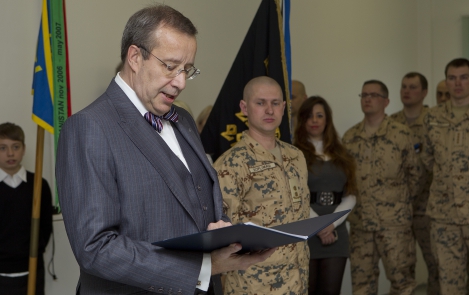-
Reset
+


President of the Republic at a meeting with the ESTCOY-14 unit that is about to be deployed to Afghanistan, Paldiski, 20 April 2012
20.04.2012
Respected Defence Force members and your next of kin, honoured Lieutenant Colonel Koplimägi, Capten Aija, Lieutenant Aavel.
I thank you all for choosing the profession of a soldier and for being willing to be deployed in a complicated operation, and in doing so standing for the security interests of the Republic of Estonia and our allies. I also thank your next of kin and friends who are supporting you in this choice.
Of late in diplomatic circles and think tanks there has been a lot of talk about 'Afghanistan end-game'. This chess term is used here to describe the end of active military operations and the considerable decrease of the international presence over the last two years. Additional context is contributed by western countries that are dispirited by the long conflict period, increased tensions in other parts of the Middle East and the hope to achieve a political breakthrough – at peace negotiations with the Taliban.
However, the chess term – 'end-game' – also suggests the possibility of surrendering. Therefore, there are opportunities for both a victory and loss, as well as a draw.
NATO did not go to Afghanistan to lose or fight for a draw with the Taliban. Let me remind you that the NATO-led operation in this country that has been ravaged by war was initiated by a wish to grant the people of Afghanistan a peaceful and successful future, stability for their country and a greater feeling of security to the whole region.
Apart from military capabilities, civil contribution and the ability of the Afghan government to rule honestly, the respectful attitude of foreign forces towards the local people, their customs and culture is also of utmost importance. And not even for a second must we adopt the attitude that we are NATO soldiers and go wherever we want and whenever we want.
Estonian soldiers have been good soldiers there – in every sense of the word. Professional in battlefield and resourceful when it comes to winning the sympathy – or at least the neutral attitude – of the local people.
This is why it hurts me to read the news about Koran being defiled in Bagram or of an allied soldier murdering villagers in a mad frenzy. Regrettably, crimes like that undermine the moral security of the allied forces over killers, looters and arsonists – the culprits we protect the local people from.
Respected members of the Defence Forces,
The security situation in your new place of deployment, the Helmand Province, has improved steadily, but it still remains complicated. Although the rebels operate under constant military pressure and our enemies have problems with a lack of resources and poor self-appraisal, they still have the ability to attack local people and the allied forces with intermittent success. The tactics that are deliberately chosen by the enemy – attacking objects, getting considerable media coverage – tell us about their certain capabilities, and they speak volumes about their weaknesses. They have been unable to restrict or deter us from expanding the secure area and transferring the responsibility for security to Afghan units in many provinces. We can see, more and more, how the forces controlled by Kabul can do exactly what the allies have been preparing them to do for years – converging, fighting back, collecting information, co-operating and offering security.
I am proud that the local population has generally trusted Estonian soldiers; this is also reflected in the large rate of detection of improvised explosive devices. Such relations – with local villagers and tribal leaders – will finally bring us success. When we leave this country some day soon, these people will remain behind and hopefully, they will remember the helpful and strong-minded soldiers who wore the blue, black and white emblem on their uniform sleeves.
I do believe that peace – or at least stability – will finally succeed in Afghanistan. A large part of the country is even now leading a life that can be described as normal. I speak of a life where you can be sure that when you send your children to school in the morning, you will see them alive in the afternoon; a life where relations with one's state are visible apart from tribal relations; a life where the fear that has ruled for years will be replaced by hope.
I do know that some of you have served in foreign missions before and many of you know the situation in Afghanistan better than most of our fellow countrymen. I do hope that you share my cautious optimism about the future of this long-suffering country.
Good friends,
You have made a choice to serve the Republic of Estonia in the most direct meaning of the word – on the frontline, in the battlefield. Your country has taught you to fulfil this mission in the best possible way and has supplied you with the best weapons we have at our disposal. You must feel the support of your country both before leaving for the operation in Afghanistan and upon your return home. I will do everything in my power to make this so. You who have fought in Iraq or Afghanistan – you are the best soldiers Estonia has.
I wish you soldier's luck. See you back at home. I wish your next of kin peace and patience at this time.
Thank you.




